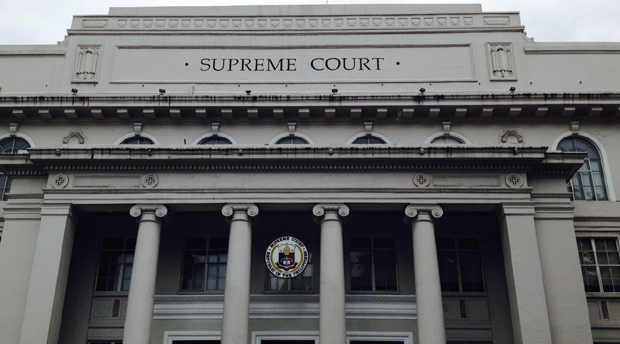
But the high court ordered the government and the secessionist Moro Islamic Liberation Front (MILF) to answer two other petitions challenging the peace agreement between the two sides and “all acts or issuances arising from it,” with the petitioners claiming the pact contained unconstitutional provisions.
In the first case, an undocketed petition filed by Rolando Mijares asking the high court to invalidate the pending BBL bill, the tribunal said it was throwing out the measure “for being premature.” The full decision was not released.
In the second case, the high court ordered the MILF and several government officials and agencies to comment on two petitions filed last Friday against the Comprehensive Agreement on the Bangsamoro (CAB), the final peace agreement between the government and the Moro rebel group that was signed in March last year.
The CAB had set the stage for the drafting of the BBL, the proposed law that will provide the legal framework for the creation of an expanded autonomous region for the Muslims in Mindanao—a “Bangsamoro” entity to replace the Autonomous Region in Muslim Mindanao—and set out its powers and functions.
The BBL is still undergoing deliberations, with legal experts, including former Supreme Court justices, denouncing the draft provisions’ conflicts with the Constitution, particularly those pertaining to the balance of power between the national government and the Bangsamoro entity.
The high court has consolidated the two cases that were filed against the CAB and ordered the respondents to file their reply within 10 days from receipt of the resolution, said the high court spokesperson Theodore Te.
Petitioners led by the Philippine Constitution Association, including three archbishops, had impleaded the MILF, government peace panel chair Miriam Coronel-Ferrer, her predecessor in the panel and now Associate Justice Marvic Leonen, Budget Secretary Florencio Abad and the Commission on Audit in a strongly worded petition in which they called the peace pact “repugnant” to the Constitution.
Invalidated agreement
The petition likened the peace agreement to the invalidated 2008 government-MILF Memorandum of Agreement on Ancestral Domain (MOA-AD), describing the CAB and its predecessor document, the Framework Agreement on the Bangsamoro (FAB), as “the crafty and ingenious revival” of the outlawed MOA-AD.
It called the FAB “unconstitutional and treacherous” and the CAB “equally void, flawed and polluted.”
It also asked the high court to stop the government from taking further steps to implement the peace agreement and compel the Department of Budget and Management to immediately stop the disbursement of funds for it.
Jacinto Paras, a former Negros Oriental representative, filed a separate petition on Friday also questioning the constitutionality of the CAB, saying the executive branch had “exceeded” its powers in negotiating and finalizing the peace pact.
Paras’ petition named as respondents Ferrer and peace panel members Senen Bacani, Yasmin Busran-Lao, Mehol Sadain and Teresita Deles, the presidential adviser on the peace process.
Leonen, who chaired the government panel that negotiated and signed the FAB in 2012, has voluntarily inhibited himself from the case, the high court said.
Appointed to the Supreme Court just after the CAB was signed, Leonen is said to have decided to recuse himself “from participation in the pending cases and any future cases” involving the FAB, CAB and the BBL because of his previous involvement in the peace negotiations with the Muslim rebels.
Lawyer and perennial nuisance candidate Ely Pamatong filed the first challenge against the peace pact in December 2012, a petition that sought to invalidate the FAB on grounds of unconstitutionality.
He asked the high court to resolve his nearly 3-year-old petition just last March.